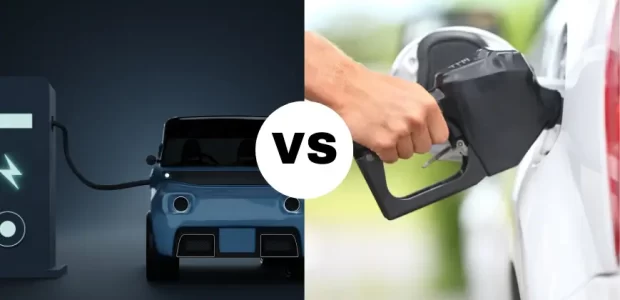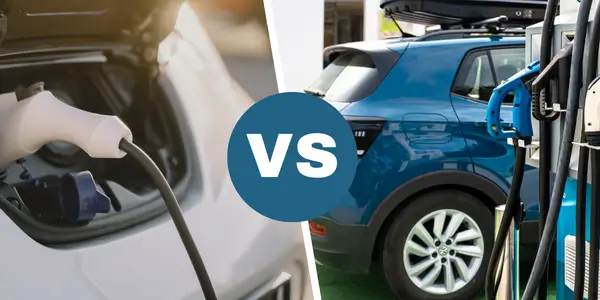
Gas Vs Electric Vehicle: Which is More Cheaper Automotive Vehicle in [2024]

Deciding between gas and electric cars can be tough. Which is the cheaper automotive vehicle in 2024?
We will explore the costs of both, from purchase price to maintenance and fuel economy. This article will break down the expenses, showing you which option saves more money. Expect clear comparisons and surprising insights.
Ready to find out which vehicle suits your budget best? Keep reading to make a smart, money saving choice for your next car. Dive in to discover whether gas or electric vehicles offer the best deal for you.
Key Takeaways
- Electric cars have lower maintenance along with repair costs due to fewer moving parts.
- EVs offer significant long term savings on fuel with lower yearly fuel costs compared to gas cars.
- Government incentives and tax breaks reduce the overall purchase cost for electric cars.
- Gas cars produce emissions while electric cars have zero tailpipe emissions, benefiting the environment.
- Charging an EV at home is more convenient plus often cheaper than frequent trips to gas stations.
Lifetime Ownership Cost: Gas vs Electric Cars
Over time I discovered that electric automobiles can end up being less expensive than petrol ones. Although this may cost more up front but the electric automobiles end up saving you money over time for a number of reasons.
First, let’s talk about maintenance. Electric cars do still have fewer moving parts. This means fewer things can break or need fixing. For instance, changing the oil or replacing the gearbox are not concerns. Over the years, this has helped me save a ton of money on repairs. For these reasons a lot of people think that electric automobiles are more affordable than petrol ones.
Then there’s fuel. Gas prices go up and down a lot, but electricity costs stay pretty stable. This makes it easier to budget. I have noticed my electricity bill is way more predictable than what I used to spend on gas. Over time, these fuel savings add up.
Do not forget government incentives and tax breaks. These can make buying an electric car even at a low price. When I bought my EV, I got a nice tax rebate that lowered the overall cost.
When these factors are combined, they usually often result in an overall cost of ownership for electric vehicles. It is lower than that of gas powered vehicles. Even though you’ll need to pay more money up front, you’ll be able to save more over time.
Fuel Efficiency and Fuel Cost
Electric cars have significant fuel plus maintenance cost savings. I consider miles per kilowatt-hour (kWh) for electric vehicles in addition to miles per gallon (MPG) for gas-powered vehicles. There is a clear difference. EVs can drive extra per mile on less energy, which means lower fuel costs.
Let’s break it down:
| Vehicle Type | Miles per Gallon (MPG) | Miles per kWh |
|---|---|---|
| Gas Car | 25 | N/A |
| Hybrid | 50 | N/A |
| EV | N/A | 3 to 4 |
Electricity is cheaper than gasoline. From what I have seen is an average gas car might cost about $1,200 a year for fuel. But an EV? It could be as low as $500, depending on electricity rates plus how much you drive.
These petrol savings add up. With development EVs become a lot cheaper to own. Even with a higher upfront cost, the savings on petrol along with maintenance make EVs a smart choice.
Maintenance and Repair Cost
I have found that electric vehicles (EVs) save a lot on maintenance plus repair costs. Unlike gas cars, EVs have fewer moving parts. Gas cars have complex engines that need regular care. But EVs use motors, which are simpler and stronger. This means less stuff to fix and take care of.
One big plus with EVs is no more oil changes. Electric motors do not use oil, so you skip the costs and time for oil changes. This saves a lot of money. Also, you don’t need to worry about things like spark plugs or timing belts, which gas cars need.
From my experience, EVs have lower yearly maintenance costs. With fewer parts, there is less that can break or wear out. This means fewer trips to the repair shop in low cost fixes when something does go wrong.
For me, the lower maintenance and repair costs of EVs are a huge deal. It makes them a smart choice for longterm savings and ease.
Environmental Impact and Hidden Costs
I’ve found that saving on maintenance costs is fantastic, but I also look at the environmental impact and hidden costs of electric vehicles vs. gas. With their engines, gas cars produce emissions that hurt the air and climate. These emissions also affect our health and the environment. Plus, high gas prices make owning a gas car more expensive over time.
Electric cars, on the other hand have zero tailpipe emissions. This means they are better for the environment. They can lower public health costs by reducing air pollution. However, there are hidden costs with electric cars too. Charging costs, while generally lower than gas, still add up. Also, making as well as disposing of EV batteries has an environmental impact.
I remember switching to an electric car. I was amazed at how much quieter plus smoother it was. I also felt great knowing I was helping the environment. However I did notice the charging costs over time. I had to consider the impact of the batteries.
Charging Convenience and Infrastructure
At home charging of my electric vehicle is super important. It saves me a lot of time compared to going to the gas station often. I just plug in my car overnight and by morning, the battery is full. This means I don’t have to plan extra stops for fuel. It is a big perk over traditional gas refueling, which takes time and effort.
Public charging stations are also crucial. They help build the electric vehicle network and ease my worries about running out of power. Knowing I can find more public chargers makes long trips easier and less stressful. But, the number of chargers can be different depending on the area, which can still be a problem.
Utility programs and incentives are great too. Many utility companies have programs to help set up home chargers, offering financial help to lower the cost. Some public charging stations even offer cheaper rates, which makes owning an electric car even better.
Government Incentives and Tax Credits
Electric vehicle (EV) charging is quite practical. Did you know that government incentives and tax credits might potentially drastically lower the price of EVs by time? Governments are keen to encourage the transition to electric vehicles and provide a number of financial incentives to offset the expense.
For example, the federal EV tax credit can save you up to $7,500. This depends on the car’s battery and the manufacturer. Plus, many U.S. states give their rebates, which can lower the electricity price even more. Some local governments even help with the cost of installing a home charger. This makes charging at home easier and saves money in the long run.
When purchasing an EV, you must apply for all available incentives in order to maximise these benefits. Here are some important points to remember:
- Federal EV tax credit up to $7,500
- State rebates that add to federal credits
- Local incentives for home charging setups
- Possible tax savings on the car purchase
- Lower running costs because electricity is cheaper to maintain than gas
These incentives helped me when I got my EV. They made it much more affordable and convenient.
Resale Value and Depreciation
When thinking about long term financial benefits of electric vehicles (EVs), I always look at how well they keep their resale value compared to gas cars. EVs usually hold their value better, which means they lose value more slowly. This is super important if you plan to sell your car later on.
Depreciation rates really matter when figuring out the total cost of owning a car. Gas cars often lose a lot of their value in the first few years. But EVs don’t drop in value as quickly. Why? Because more people want them, technology keeps getting better and there are government incentives making them more attractive.
One big reason EVs keep their value is that more people want eco friendly cars. As more folks worry about climate change and want to lower their carbon footprint, the market for used EVs grows. This means higher resale prices. Plus, better battery tech and longer lasting parts help EVs lose value slower.
For anyone looking to buy a car, thinking about future resale value is key. Choosing an EV could mean better financial returns over time because they hold their value and depreciate slower than gas cars.
Conclusion
Electric cars are the best overall choice in 2024 for those seeking cheaper automotive cars. Despite a higher upfront cost, EVs save money in the long run through lower maintenance, repair and fuel costs. With fewer moving parts, they have fewer repairs and no need for oil changes.
They offer significant fuel savings, with electricity costs being more stable and predictable than gas prices. Government incentives and tax credits further reduce the purchase cost. My personal experience confirms these savings, making EVs a smarter and more economical choice for budget conscious drivers. Additionally, EVs benefit the environment with zero tailpipe emissions, enhancing their overall value.
